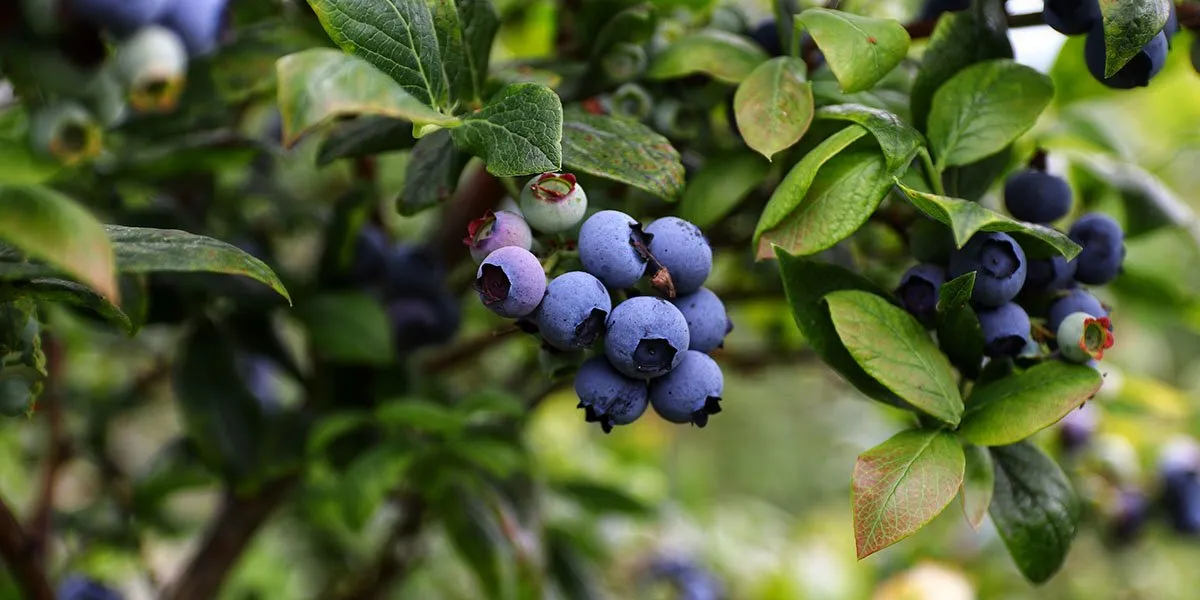Some fruits are more acidic than others, but practically none are considered alkaline (pH >7, softer than water). Blueberries are fruits with a higher than average acidity, comparable to the acidity level of raspberries, grapes, and grapefruits.
According to Clemson University, the pH of blueberries varies from 3.12 to 3.33. This would make blueberries a very acidic fruit. Blueberry juices are equally acidic, which can be potentially harmful to teeth enamel.
The pH level scale varies from acidic (pH of 0-7), to neutral (pH of 7), to alkaline (pH of 7-14). All common fruits fall in the acidic range, some more so than others. This overview from Healthline provides a helpful comparison range.
Blueberries Are Acidic Fruits
While blueberries are objectively healthy for you, it cannot be denied that the acidity of these berries can have some unwanted side effects. This is especially true for people that suffer from acid reflux problems, or even gastroesophageal reflux disease (GERD).
People that are sensitive to acid reflux effects should therefore try to limit their intake of these healthy berries. Consumption of blueberries might increase their negative side effects, most notably in the form of nausea.
Dental problems are another commonly cited risk of high acid fruits. Not only do acidic fruits erode tooth enamel with improper care, eating blueberries on a daily basis can also contribute to darkening and staining your teeth.
How Much Acid Is In Blueberries?
Ripe, edible blueberries contain about 1 to 2% of acid, citric acids made up 77 to 87% of all the acid content found in blueberries. Blueberries will contain a variety of anthocyanins (such as cyanide), as well as different types of organic acid.
A 2015 study by Kang et al. claimed wild blueberries contained, on average, more acid than cultivated varieties. Picking wild blueberries might therefore expose people to a higher amount of acid.
Negative Side-Effects Of Acid: Best Practices
Don’t stop eating blueberries, they are extremely healthy! Claiming that you should not eat blueberries because of their acidity would be too extreme. Instead, it is wise to implement a few best practices to avoid any possible negative side effects from the acid in the fruit.
Here are a few practical tips you should consider when eating blueberries regularly:
- Daily dental care: Don’t brush your teeth directly after consuming acidic fruits or fruit juices. This can erode teeth over time. Instead, flush your mouth with water and wait at least 30 minutes to an hour. Do make sure to brush your teeth twice a day, because acidic fruits still contain a lot of sugar.
- Use straws for juices: Blueberry juice is especially damaging to tooth enamel, more so than the fruit itself. Preferably drink fruit juice with a straw to avoid contact with the teeth where possible.
- Wash out with water: After consumption of juice or berries, wishing the remains out with a glass of water immediately after consumption will compensate for a lot of the lingering ‘damage’ the acid might do. The faster you drown out the acid, the better.
- Reduce acid reflux: Consider combining your blueberries with whole grains like oatmeal, and yogurt. You can also mix it with vegetables like sweet potatoes, carrots, beets, broccoli, or green beans. Alternatively, choose to eat less acidic fruits like melons or bananas instead.
Acid Reflux & Eating Blueberries
For those that regularly suffer from acid reflux problems, eating a blueberry in a fruit mix every now and then shouldn’t be a problem (but don’t mix them with equally acidic berries like raspberries). However, daily consumption of a handful of berries might become a health problem.
If you’re eating berries because of their many vitamins and minerals, you are not alone. The little colored berries are absolutely packed with healthy nutrients! Therefore, it’s definitely worth it to find a way to eat healthy berries while also having acid reflux problems (except if you suffer from GERD).
Luckily, a blueberry might not be as bad as you might think. To avoid possible acid reflux problems, balance your diet with low-acid foods and mix your acidic fruits with less acidic varieties as much as possible. Acidic juices can be diluted with water, but don’t drink them too regularly.
Are Blueberries Too Acidic For Babies?
Blueberries are generally not too acidic for babies, but might cause rashes or upset the stomach of your infant. Avoid feeding your baby blueberries without mixing them with less acidic fruits like bananas or melons. It is acceptable to add blueberries to a fruit mix by mashing them into a puree.
Please consult a licensed medical professional if your baby might have any medical indications. Especially do this when stomach problems are a common occurrence. They will be able to assess if blueberries are suitable fruits for your young child.
Here’s a full list of ‘risky fruits’ for your baby. Consider healthy alternatives, of which there are plenty. For example, check out this article about dragon fruit for babies we recently published!
High In Acidity, But Very Nutritious
The blueberry is a wonderful little natural snack. The acid in the fruit should generally not deter adult humans to consume the fruits. However, it will be important to implement the best practices. Especially when you consume a lot of acidic berries on a daily basis.
The greatest risks related to acidic fruits are in relation to the gastro-intestinal system (stomach and gut), as well as the teeth. Make sure to implement the proper dental care described in this overview, and mix your diet with plenty of non-acidic foods.
That way, nothing should stop you from consuming a handful of those healthy blueberries on a daily basis. Our recommendation is to mix and match with neutralizing oats and milk-based products. It would be perfect as a breakfast food or snack in the middle of the day. Enjoy your berries and make sure to stay safe!
